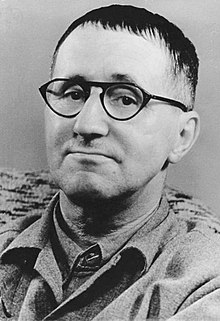
Brecht – a
miniseries in two parts – is a historical and biographical drama which
premiered on German television (ARD) in 2019. The main character is the famous German
playwright and poet Eugen Berthold Brecht who is known professionally as Bertolt Brecht (1898-1956). Here is some basic information
about this drama:
** Writer and
director: Heinrich Breloer
** Narrator:
unknown
** Language:
German
** Subtitles:
German – no English subtitles!
** Run time: 2 x
90 minutes = 180 minutes
The cast includes
the following:
** Tom Schilling
as the younger Berthold Brecht (covering the years 1917-1933)
** Burghart
Klaussner as the older Berthold Brecht (covering the years 1949-1956)
** Mala Emde as
Paula Banholzer (1901-1989) – aka Bi – she is Brecht’s first girlfriend – they
have a son Frank (1919-1943)
** Friederike
Becht as Marianne Zoff (1893-1984) – an Austrian actress – she is Brecht’s
second girlfriend and his first wife (they are married 1922-1927) – they have a
daughter Hanne (1923-2009)
** Manuel Zschunke
as Arnolt Bronnen (1895-1959) – a friend
** Franz Hartvig
as the younger Caspar Neher (1897-1962) – a friend
** Ernst Stotzner
as the older Caspar Neher
** Adele Neuhauser
as the younger Helene Weigel (1900-1971) – aka Helli – a German actress – she is
Brecht’s second wife (they are married 1930-1956) – they have two children
** Lou Strenger as
the older Helene Weigel
** Leonie Benesh
as the younger Elisabeth Hauptmann (1897-1973) – aka Bess – she is Brecht’s
secretary and translator
** Jaroslava Laufenova
as the older Elisabeth Hauptmann
** Oscar Olivo as
Kurt Weil (1900-1950) – a musician and composer
** Trine Dyrholm
as Ruth Berlau (1906-1974) – a Danish friend (they meet while Brecht is in exile in Denmark; later she follows him to Germany; this role is played by a Danish actress)
** Laura de Boer
as Isot Kilian (1924-1986)
** Franz Dinda as
Egon Monk (1927-2007)
** Vincent
Redetzki as Martin Pohl (1930-2007)
While this drama
is based on a true story, it is not a documentary film. It is a dramatized
version of events. Not everything happened exactly as shown here. But the basic
story is true.
Since this drama
is based on a true story, the basic facts are part of the public record. They
are not a secret. Therefore I feel free to mention some of them here.
I do not wish to
spoil the viewing for anyone, but I have to mention a few details in order to
explain my rating.
This drama is a
combination of three elements:
# 1. Ca 80 per
cent = a docudrama (in colour).
# 2. Ca 10 per
cent = old clips and photos (in black-and-white).
# 3. Ca 10 per
cent = interviews with people who knew Brecht or who worked with him (some are in
black-and-white, while others are in colour).
The combination of
the three elements is interesting. I like it, but I can see that some reviewers
do not like it. They feel the flow of the regular docudrama is interrupted and disturbed
by the second and the third elements.
As stated above,
the drama is divided into in two parts:
** Part one covers the time 1917-1933
** Part two covers the time 1949-1956
In part one the
role of the younger Brecht is played by Tom Schilling. In part two the role of the
older Brecht is played by Burghart Klaussner.
What about the
time 1933-1949? Where is Brecht during these years? He is in exile in several
locations. Here are the places (in chronological order): Prague, Zurich, Paris,
Denmark, Sweden, Finland, the US, and finally Switzerland. Apart from two brief
flashbacks to events in the US (in part two), the years of exile are not
covered in the drama.
As stated above,
this drama is about the life and work of Brecht. We see him as a playwright and
as the director of some of his plays. We also see his private life. In fact, most
of the drama is devoted to this aspect of his life. It seems Brecht has an
intimate relationship with almost every woman that he meets. What is neglected
here is his views on politics. Almost no time is devoted to explaining what
Brecht thinks about this topic.
What do reviewers
say about this drama? On IMDb it has a rating of 69 per cent, which corresponds
to 3.5 stars on Amazon. On the German version of Amazon there are at the moment
thirteen reviews of this product. The average rating is 4.4 stars.
If you ask me,
both these average ratings are too high. Why? Because the Brecht that we see in
this drama is not good enough. We know he was talented as a playwright and as a
poet, but he does not seem very talented here. He is not charming. Often he is
not likeable. In fact, it is hard to understand why so many women wanted to throw
themselves at this man.
Tom Schilling’s
version of the younger Brecht is selfish, but not too bad. Burghart Klaussner’s
version of the older Brecht is a bully and a tyrant who yells at everyone
around him. But most of them put up with him. He almost never hears the word
“No!”
However, the most
important flaw is the lack of politics. Brecht was a very political person. His
plays and his poems often have a political message.
In 1949, when many
Germans are moving from East Germany to West Germany, Brecht decides to move in
the opposite direction: he moves from Switzerland to East Berlin. Why? We need
an explanation. But it never comes. What does he think about politics? Sadly,
there is almost no answer in this drama. It is a shame. A missed opportunity.
This drama is not great;
it is not even good; it is just average. And therefore it cannot get more than
three stars.
*****

Bertolt Brecht (1898-1956)
*****
No comments:
Post a Comment